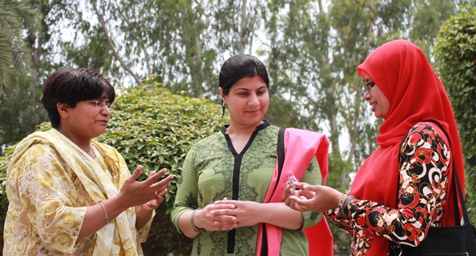Training to end discrimination in South Asia
Date:
New Delhi - When Saifora Barekzai chose to attend the training of trainers on the Convention for Elimination of All Forms Discrimination against Women (CEDAW), she did so with a clear objective in mind. “I wanted to learn how to implement CEDAW on a practical level. Afghanistan has ratified CEDAW but there are great problems with implementation,” she says. Saifora and 29 other government officials, human rights activists and NGO professionals from South Asia benefitted from similar insights during the Regional Training of Trainers on the Convention in New Delhi.
CEDAW is the first international treaty that addresses discrimination against women comprehensively in all areas. The Convention has been ratified by all South Asian countries and calls on states to respect, protect, and fulfill women’s human rights. It requires states to expressly consent to taking on obligations to implement the treaty through the act of ratification.
South Asia has made much progress in ensuring that laws are in place to protect women. But much more needs to be done to end discrimination against them. For example, only 4 out of 9 South Asian Countries have equal inheritance laws between men and women for land and property.
Organised by the Partners for Law in Development (PLD) and UN Women, the training inspired people to accelerate progress and implement the Convention. It was the second in a series of training to help professionals across South Asia implement the Convention.
Saifora, for example, has learnt valuable techniques for creating awareness and bring about practical change on access to justice for women.
Ganga Thapa, from the Protection Desk in Kathmandu, will use the information gained from the workshop to monitor whether regional officers are meeting their obligations to tracking discrimination against women. Ganga will also use her training to make women and girls aware of their rights. “A lot of girls are mistreated by their families,” she says. “Many are unaware that the treatment they receive is wrong, since they have grown up thinking that it is socially acceptable,” she says.
Bhutan has so far submitted seven periodic reports on the implementation of the Convention. Deki Dema from Bhutan felt that listening to different perspectives was enriching. “It has been interesting to meet people from all over Asia. I have heard different points of view. I am optimistic about the future for Bhutanese women, but there is still a long way to go,” says Deki who works with Bhutan’s National Commission for Women and Children. She hopes to create change by increasing awareness in hard-to-reach areas in Bhutan.
Human rights belong to all human beings. Respecting these rights despite religious and cultural differences is the key to the Convention. “This training helped me understand that the implementation of the Convention does not have to conflict with Islam. This has been the government’s excuse on their failure to implement certain guidelines,” reflected Nasheeth Thoha from the Maldivian Democracy Network, a human rights organization.
Hayatullah Jawad from the Afghanistan Human Rights Research and Advocacy Organisation also agrees on the need to reconcile gender equality and Islamic principles in a conservative Afghani society. “CEDAW needs the support of the religious community,” he says. He plans to establish a network of women’s rights groups, using the research conducted by his organization in Afghanisatan.
On returning to the Odisha state in India, Mamata Taipathy, who works for Centre for Youth & Social Development (CYSD), hopes to create a training programme to educate staff on the importance of the Convention. “Currently 70 percent of the senior representatives are men, especially the board members. I want this to change to become a fairer and more gender balanced working environment,” she says.
Mamata, Deki and other participants will go on to train others in their countries on the importance of ending discrimination through the Convention.
